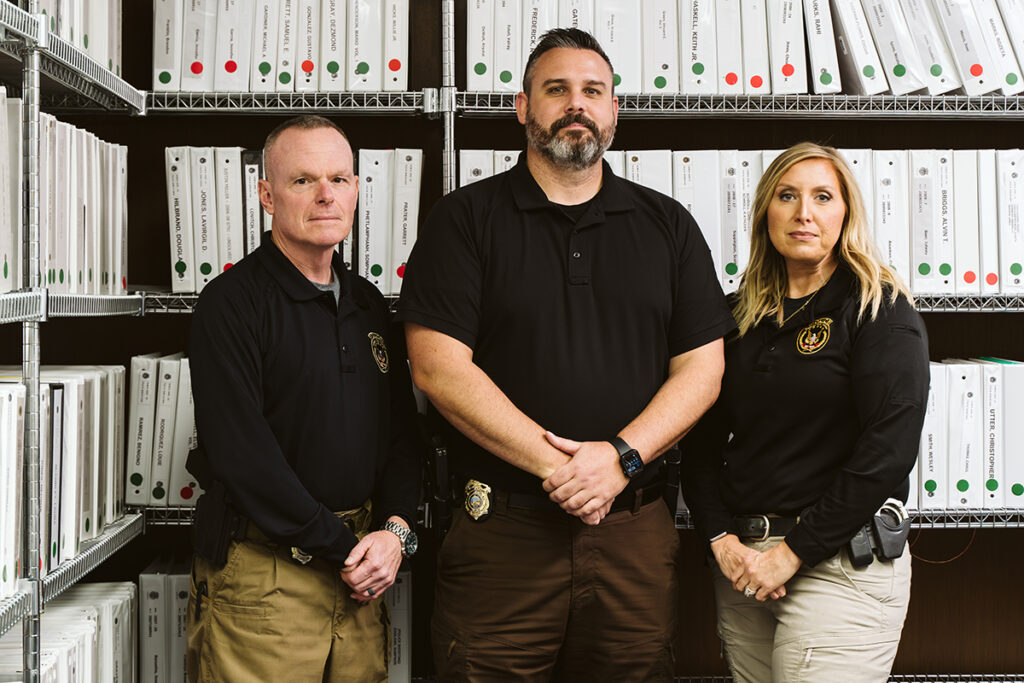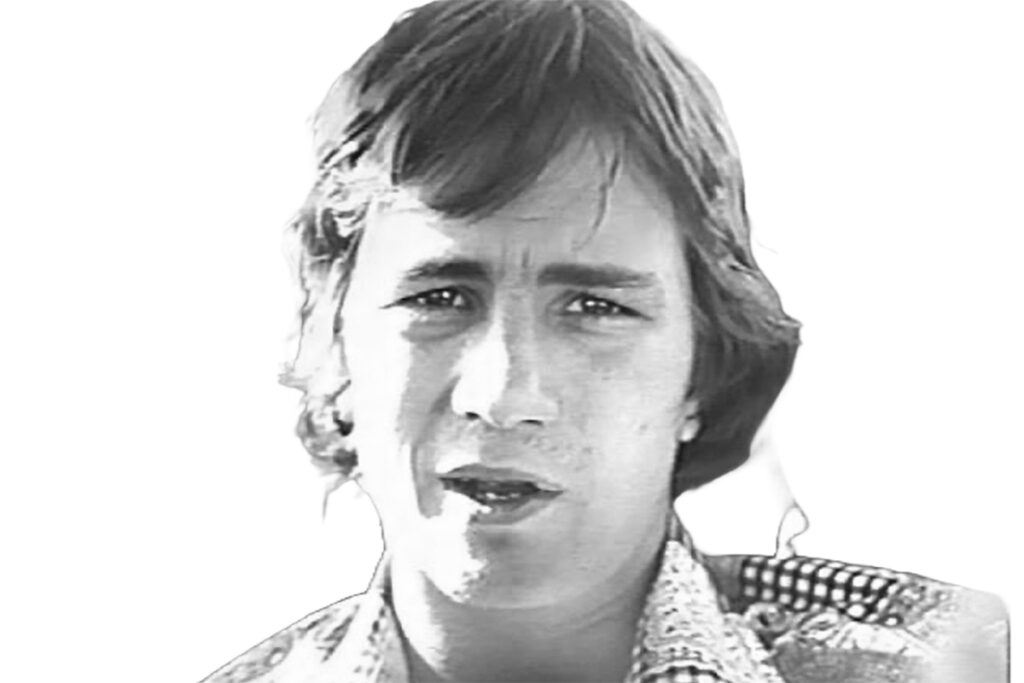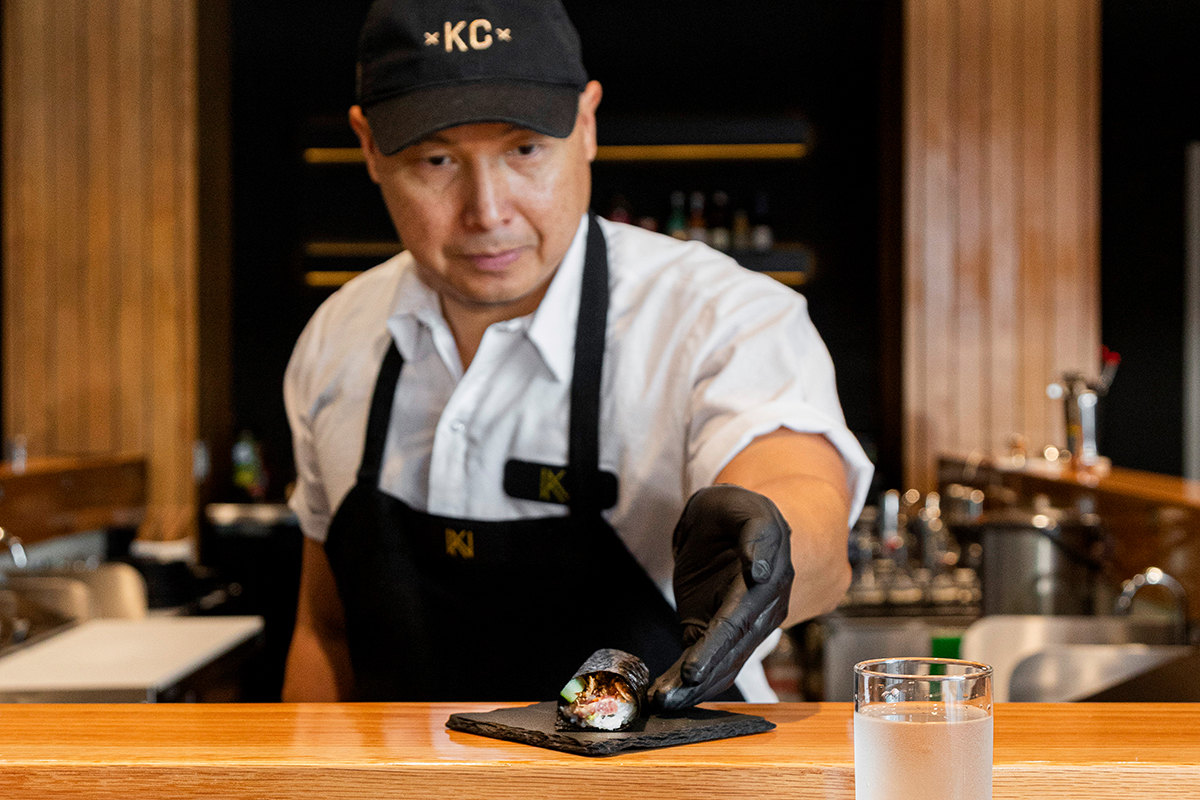Pictures of homicide victims regularly appear on the nightly news. Haunting images of smiling people just living their lives until one fateful day—now forever gone.
For the families of these victims, the questions never end: Who murdered them? Why? Was it a drug deal gone bad? Domestic violence gone too far? A case of mistaken identity? Or were they simply in the wrong place at the wrong time?
Someone has to clear up the mystery. Someone has to get closure for the family. Someone has to take the time to revisit and review the evidence and take another run at solving the case.
That’s where cold case detectives come in.

Kansas City, Kansas, police chief Karl Oakman proposed the creation of a KCK cold case unit as part of the police department’s strategic plan in 2021, when he was sworn in as chief. In January 2022, the unit began its work.
The four KCK cold case detectives—Jeff Irwin, Lily Szewc, Stuart Littlefield and unit leader Captain Katie Yarsuli —have identified suspects in about 15 cold cases, Oakman says. Six people have been charged.
One of the suspects, Gary Dion Davis, was arrested and charged in September 2023 for two unsolved homicides dating back nearly 30 years based on DNA matches: Christina King, found murdered behind an abandoned building on Christmas day in 1998; and Pearl Barnes, found murdered in a vacant house in November 1996.
Detectives also suspect that Davis, a long-haul truck driver moving about the country, may have killed more. “We believe that once we’re done with the investigation, we may be able to connect him to other cases, but we still need the public’s health help with identifying all the places he’s been,” Oakman says. “We’ve reached out to other agencies going through their cold cases. But based on my experience, and based on him killing two women, it’s likely he killed more. Mr. Davis had been going on with his normal life like nothing happened until we caught him. This is another example where we’ve taken a dangerous individual off the streets.”

In 2015, the Kansas City Police Department opened its own missing persons and cold case unit, eventually claiming they were so successful that they were running out of work, according to the department’s June 2015 newsletter. Yet their website currently lists about 200 unsolved homicides. The unit was disbanded in 2022 over the objections of Kansas City Mayor Quinton Lucas.
Meanwhile, KCK detectives are methodically working through each cold case. “When you talk about a cold case homicide, one of the difficult things is not being able to share as much information as you wish with the family,” Oakman says. “Unfortunately, oftentimes that suspect can be connected to the family or someone who the family deals with every day and they don’t realize it. At the same time, you have to find that balance to where you can give the family information so you know that they feel that you’re still investigating it and that their loved one is valued.”
Family members just want to know what happened, he says. “I think that’s the biggest thing. You know they were murdered. But what were the circumstances? Who did it? Why is this person still walking around? I just felt the need to bring justice to the families.”
Solving cold cases, or “clearing” them, in law enforcement parlance, has become more viable with the evolution of high-tech forensic sciences. When DNA testing came on the scene in the early 1990s, it was a game changer, and the technology has been improving ever since, Oakman says. There have also been advances in ballistics evidence coming from the National Integrated Ballistic Information Network developed by the Bureau of Alcohol, Tobacco, Firearms and Explosives. “We always could trace ballistics, but now we can trace shell casings,” Oakman says. “So that’s been a big advance, where we can now tell if the same gun was used, just based on the shell casing. Now we are able to get DNA off of shell casing and shotgun shells, that kind of thing. So there’s a lot of advancements that have helped us.”
There are several high-tech crime labs in the metro available for law enforcement, including the Johnson County Sheriff’s Office Criminalistics Lab in Olathe, the Kansas Bureau of Investigations Forensic Science lab in KCK and the Kansas City Crime Lab just east of downtown Kansas City.
Persistence is the key. One KCK case involved a newborn found in a dumpster in November 1976. When officers responded, they found the female infant with her umbilical cord still attached, wrapped in a towel inside a plastic shopping bag. Autopsy results indicated that the infant was born alive and died within a few hours of birth. The cause of death was listed as possible exposure, loss of blood through the umbilical cord or brain trauma.
KCK detective Jacobs found the possible mother, now in her 60s, through a genealogy database based on the baby’s DNA recovered from the towel wrapped around the infant. By identifying genetic relatives and building family trees through genealogical research, investigators can narrow down potential suspects.
The mother’s DNA matched the baby’s DNA.
The mother, at the time, was 17 or 18. She told detectives that her grandmother took the baby and the mother never saw her baby again. The grandmother has since passed, “but we were able to close that case,” Oakman says. “From indications from the investigation, this young lady was raped by a family member or someone close to the grandmother. It was just good to get that closure last year.”
The unit has cleared that case, two other cases from 2000 and one from 1996. “It’s great satisfaction for the detectives,” Oakman says. “That’s one of those things where it makes everything worth it, for your whole career, when you can really bring closure and relief to family and friends of someone who was killed and the case went unsolved for so many years.”

Detectives never know when or from where a break in a case might come. Oakman tells a story about cold case suspect Leon Caldwell, who is doing time in Lansing Prison for another murder. Caldwell was in the prison’s hospice care and was going to die there. “He came forward in September 2023 and said: ‘Hey, I got to get this off my chest. I killed a 16-year-old in 1996 because he was selling drugs on my cousin’s territory. I was hired to come up to Kansas City and kill him.’ Everything matched with the evidence we had, and we were able to get him charged.”
In KCK’s cold case unit, detectives are able to work on cases dating back to about 1975 with the information they have. These cases have been ranked and put in four different categories, Oakman says. The highest priority and the first category is when the victim’s identity is known and the suspect, or a possible suspect, is listed. The next category is when the victim’s identity is known and there is no suspect, but there is possible DNA evidence. The third category is when the victim’s identity is known, some evidence hasn’t been tested, and there is no suspect. In the last category, the victim’s identity is unknown and there is no suspect or evidence. “Our mandate is to review every open case that we have,” Oakman says. “So there is a point in that process that a case can get moved up if we get new information or if someone calls the tips hotline, which is always a great resource.”
Oakman says they are always looking for innovative ways to solve cases. Recently, Oakman’s unit has been considering using artificial intelligence to go through case files, look at inconsistencies in potential suspect statements and identify possible avenues of investigations.
In April 2022, a deck of playing cards—each card with information about an unsolved Kansas crime—was distributed to state prisons and county jails across the state. Each card includes brief facts about the crime and a phone number for anyone to call who might have information about said crime. A selection committee with representatives from the Kansas Department of Corrections, the Kansas Bureau of Investigation, the Kansas Attorney General’s Office and local law enforcement prioritized cases to highlight on the first deck of 52 cards.
As of November 2024, not one case from the cards has been solved, but that reflects broader concern, says Oakman. The percentage of unsolved homicides in the U.S. rose from 30 percent in 1998 to 45 percent in 2020, according to the Murder Accountability Project.
Unexpected events happen all the time in the course of a murder investigation, Oakman says. In the highly publicized 2004 murder of Summer Shipp, a woman in Independence, detectives finally thought they had enough evidence to arrest Jeffrery Sauerbry, a long-time suspect in Shipp’s murder case. Sauerbry was charged, but he was found not guilty in a 2016 trial. The case is now back in the hands of detectives to figure out if they missed or overlooked key evidence. Bottom line: Shipp’s killer is still out there.
There is no statute of limitations for murder. Finding justice may take time, but the search never ends. “We have a lot of unsolved cold cases,” Oakman said during a press conference about the unit’s work. “So it may not be today, it may not be tomorrow. In fact, it may not be this year. But there’s going to be a time you may be in the drive-through line or you may be at the grocery store. We’re going to eventually get you.”
Three Kansas City Metro Cold Cases
Zachary Pearce, 24
December 14, 2017

Pearce and a friend were walking home from Westport when they were approached by the suspect who pointed a gun at the victims and demanded their money. They were complying when the suspect fired the gun, killing the victim. The suspect was with at least one other person and was seen fleeing the scene in a stolen auto. There is up to a $25,000 dollar reward eligible for information leading to an arrest through the TIPS Hotline at 816-474-8477.
Star Boomer, 39
February 23, 1999

Boomer was at Uncle Mike’s Bar at 49th Street and Metropolitan Avenue and got involved in a violent altercation with a man believed to be a lifelong criminal with a history of violent behavior, particularly toward women. At one point during the evening, Boomer was allegedly knocked to the ground, causing her to lose consciousness. She has not been seen or heard from since. A reward of $5,000 is being offered for tips leading to an arrest. Tips can be called into the KCK Police Department’s homicide/robbery unit at 913-573-6010 or the Kansas Bureau of Investigation at 1-800-572-7463.
Tony Payne, 19
July 2, 1977

Payne was found inside a residence at the 7900 block of West 87th Street in Overland Park in critical condition. He died in the hospital. An autopsy confirmed the cause of death as two blows to his head. His cold case was reopened in 2021. A reward of $2,000 is being offered for information leading to an arrest. Cold case tips can be called into the Criminal Investigations Division of the Overland Park Police Department, or through the TIPS Hotline at 816-474-8477.





